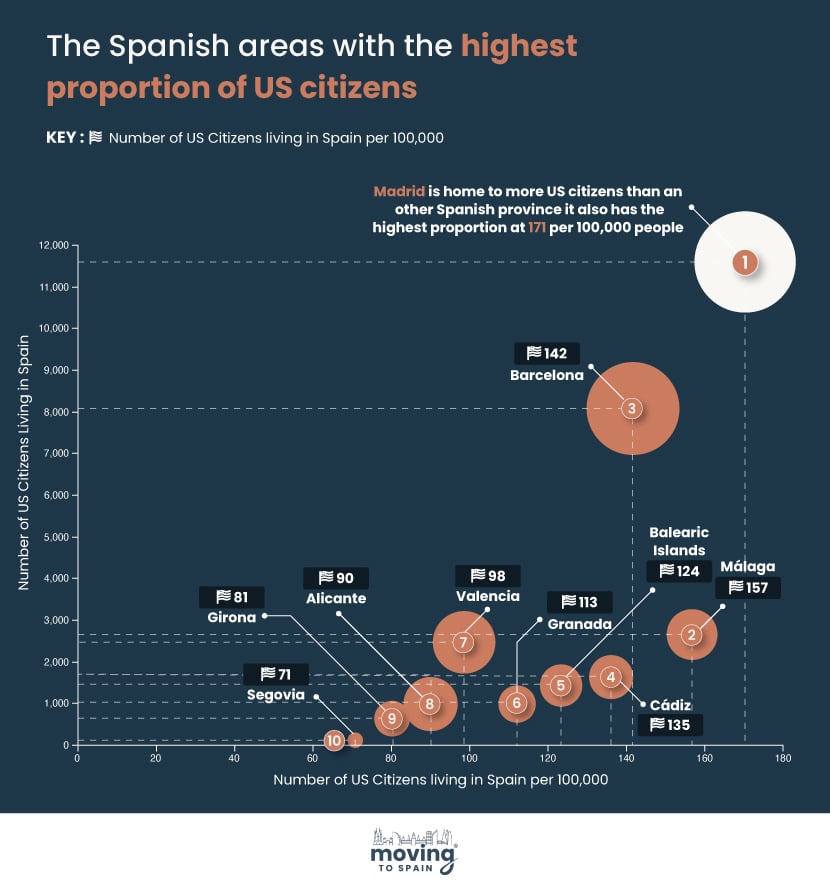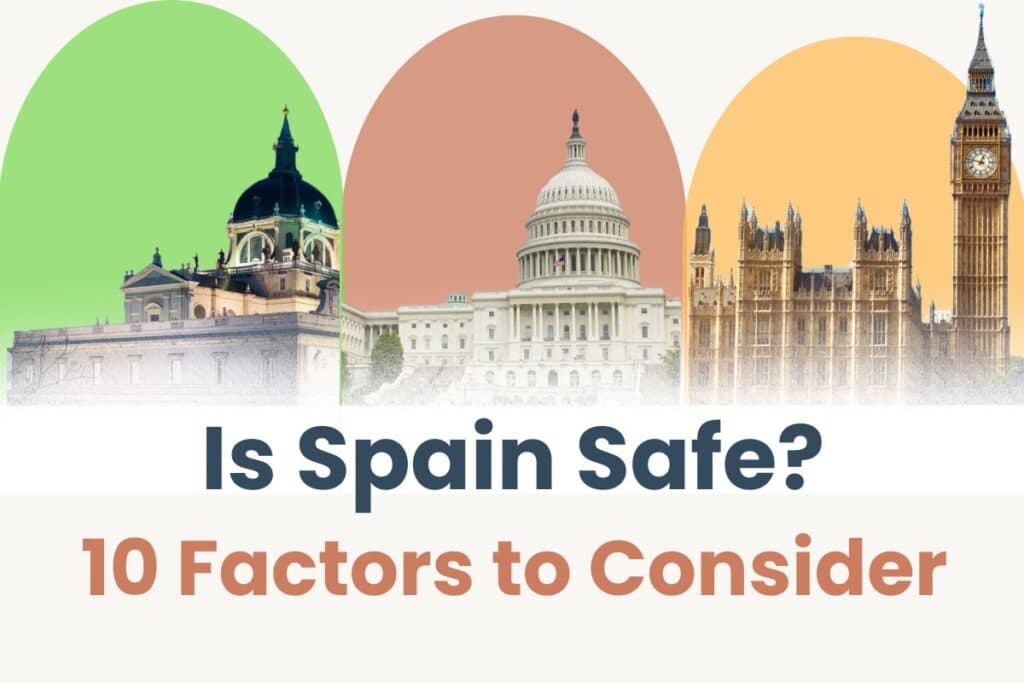Americans are moving to Spain in ever-increasing numbers, and 2025 looks to be a record year. Spain’s wonderful lifestyle, affordable healthcare, and low cost of living make living in Spain as an American a compelling package. We help American families, workers, digital nomads, and retirees moving to Spain from the US every week.
ALSO READ: Living in Spain as an American Expat >> Spain Compared to the US
Understanding Different Spanish Visa & Residency Types for US Citizens
There are many options for US citizens moving to Spain, but all Americans will need a Spanish visa and residency.
A visa is permission to enter Spain, and residency is permission to live in Spain. They are different things, often called by the same name, but don’t stress too much. For example, you can enter Spain on a non-lucrative visa and then apply for non-lucrative residency once you are here.
Note: You can include dependent kids and parents on many Spanish visas as long as you can support them. You also need Spanish private health insurance for most visa and residency applications.
Top 3 Spanish Visas for Americans Moving to Spain from the US
Each visa and residency option has rights and restrictions. Here are the most popular Spanish visa and residency options for Americans moving to Spain. You can see our guide to types of Spanish visas for a complete list, including Spanish work permits.
1) Non-Lucrative / Retirement Visa and Residency
The Spanish non-lucrative visa is also called the Spanish retirement visa. This option is a favorite of Americans looking to retire in Spain.
- Best suited: Retirees and people who don’t need to work while living in Spain.
- You Need: In 2025, you need €28,800 annual passive income from sources like a pension, annuity, or investments.
- Restrictions: You can’t work for either a Spanish company or remotely for a US company.
- Pathway to Permanent Residency and Citizenship: Yes
- Our Guide: Spanish non-lucrative visa guide.
2) Golden / Investment Visa and Residency
The Spain Golden visa is an excellent option for Americans planning to buy a property in Spain.
- Best suited: Those with at least €500,000 to invest in Spain.
- You Need: To buy a suitable property or make another qualifying investment in Spain.
- Restrictions: You must maintain the investment for at least five years.
- Pathway to Permanent Residency and Citizenship: Yes
- Our Guide: Spain Golden visa guide.
Note: This program will close in April 2025, so if you want to use the Golden Visa, you must act quickly.
3) Digital Nomad / Remote Work Visa and Residency
The Spanish Digital Nomad visa is an excellent option for Americans moving to Spain to work remotely.
- Best suited: US citizens working remotely for US clients, freelancers, and digital nomads looking to live in Spain.
- You Need: Steady annual income from non-Spanish sources of €32,240.
- Restrictions: You can only earn a small portion of your annual income from Spanish clients.
- Pathway to Permanent Residency and Citizenship: Yes
- Our Guide: Spanish Digital Nomad visa guide.
READ MORE: All 10 Spain Visa Types > Tips to Choose and Get Approved
2 Top Tips for Spain Visa and Residency Applications for US citizens
Spanish visas for US citizens can be complex. There are many types of Spanish visas and residency, with pros and cons for each. Understanding your requirements and picking the right pathway is vital before you start any other planning.
The second tip is to use a specialist immigration lawyer in Spain to help you through the process. Spanish red tape is legendary, and requirements change daily; different consulates have different requirements. Our partner, Raquel Moreno (LLB), says,
“Spain is open to Americans immigrating to Spain in many cases, but you must follow the application process required for your specific visa to succeed.”
Need help with your Spain visa or residency?
We partner with two highly rated, English-speaking immigration law firms in Spain — each thoroughly vetted for excellence in service, professionalism, and client satisfaction. Schedule a 30-minute consultation with them to explore your best options, understand the process, and get personalized answers to your questions.
Money Matters: USA vs Spain
You should consider four main areas when planning a move from the US to Spain. The big one is the cost of living in Spain vs the US. What will rent, healthcare, groceries, and living cost you monthly versus your current budget? The second is the one-off relocation costs you’ll need to pay for. The third is how to manage long-term cross-border financial planning. The fourth and final is managing your tax liabilities in Spain and the US.
Cost of Living in Spain vs the US
On average, the cost of living in Spain is 32% cheaper than in the US. So what does that mean? The research shows that, on average, a similar lifestyle (size of city, size of house, same expenditure items) is 32% cheaper to live in Spain than in the US. So, if you spend $100,000 per year in the US, you’ll pay $68,000 for the same lifestyle.
But you are not average and don’t live an average life. We’ve built a Spain vs US cost of living calculator to solve that problem. The calculator has a customizable budget that allows you to pick the area of Spain you’ll live in, plus adjust your spending to get a clear picture of how much your new life in Spain will cost.
Moving From the US to Spain Relocation Costs
Moving from the US to Spain, the US to Spain has several one-off costs. You’ll need to pay for your visa and residence permit, moving your things, and your travel. Each move is unique, so use our Moving to Spain Budget Planner and Moving to Spain Checklist to ensure no surprises.
Cross-border Financial Planning for Americans in Spain
Once you live in Spain, you’ll spend euros and be part of an entirely different economy. So, how do you ensure that your investments and savings work as hard as possible for your future? Many Americans leave all their investments in the US and transfer money from the US to Spain as needed.
For others, investing in Spain (and in a euro-based economy) makes more sense to take advantage of the opportunities. For many, buying a home in Spain or starting a business is an integral part of the move. Speaking to an experienced Spanish/American cross-border financial advisor can save you vast amounts of stress and money either way.
Navigating Taxation for US Expats in Spain
Once you move to Spain from the USA, you’ll almost always become a tax resident in Spain (regardless of whether you are a dual citizen). That means you must submit a Spanish tax return and be liable to pay Spanish tax on your global income. You must also consider taxes like the Spanish wealth tax and Solidarity tax.
But, the US and Spain have a tax treaty, or double tax agreement (DTA), which means you don’t pay tax twice on the same income. But, as a US citizen, the US still requires you to submit an American tax return each year, even if you pay no tax to the IRS. You can also claim some special deductions on your US return to offset any income. Social security payments and other pension income are usually taxable in Spain as income, but the Spanish tax authorities will deduct any tax you’ve already paid.
Programs like the Beckham Law can mean paying much less tax for many Americans working in Spain.
We’ve written an Expat guide to the Spanish Tax system to guide you through your US-to-Spain tax journey.
Need Tax Advice?
Need clarity on your tax obligations and a solid financial strategy ? Schedule a consultation with our recommended tax advisor, Louis, to gain complete clarity and peace of mind.
Choosing Where to Live in Spain as an American
By European standards, Spain is a big country. It has the second-largest area in the European Union (EU), at around 193,000 square miles. That makes Spain about 75% of the area of Texas but with a population of 48 million people (the same as California and New Jersey combined).
All across Spain, people are friendly to Americans, but the geography varies enormously, from the temperate Mediterranean coast to the snowy Pyrenees. The Atlantic costs are reminiscent of Ireland, and the central desert areas are as remote as Europe gets. Madrid and Barcelona are modern European cities, while small villages along the coast feel like a step back in time.
We did a study on where Expats are choosing to move in Spain. Madrid, Barcelona, and Valencia have the highest number of American Expats as Spain’s three largest cities. But Americans also love smaller towns and cities across the entire country.

Check out our Spanish Expat destination guides to find the perfect new Spanish home for you and your family. The best places to live in Spain as an American will depend on what you and your family value most.
Health Insurance and Healthcare in Spain for Americans
Most Americans living in Spain have private health insurance. There are several reasons for this, but the most important is that it offers outstanding value for exceptional care. American clients have reported paying less for annual private health insurance than their monthly premiums in the USA. And they often experience better standards of doctors, hospitals, and support.
Spain has an excellent free public healthcare system, but it has challenges for many Americans. When Americans living in Spain use public healthcare, they almost always have private health insurance as well.
6 Reasons That Americans Choose Private Healthcare In Spain
- Visa Health Coverage: Your Spanish visa often requires private health insurance. It’s essential for ensuring access to healthcare as soon as you arrive.
- No Public System Eligibility: To use Spain’s public healthcare system, you must pay into Spain’s social security. Private coverage becomes a must.
- Personalized Healthcare Choices: Private healthcare in Spain lets you choose your doctor based on language, location, or specialty, giving you more control.
- Quick and Flexible Access: Expect faster appointments and procedures with private healthcare, plus more convenient scheduling options.
- English-Speaking Providers: Many private healthcare providers in Spain offer English-speaking staff and resources, which is crucial if your Spanish isn’t fluent.
- Dental Care: Public healthcare in Spain doesn’t cover dental services. Private insurance helps avoid high out-of-pocket costs.
You can read about the Spanish Healthcare system or learn more about Private Health insurance in Spain.
Need Spain Private Health Insurance?
We constantly monitor the market and recommend only insurers whose policies meet visa requirements for all of our clients and who are recommended by friends and the community.
one form – up to three quotes. EASY!
Legal and Administrative Steps to Immigrate to Spain from the US
When we chat to Expats about the downside of moving to Spain, navigating immigration bureaucracy rates high on most lists. The visa application, residency registration, and identification cards can all be challenging. Find out how the process works with our guide to your TIE, NIE, padrón, and more. While navigating the Spanish immigration system can be confusing, taken step-by-step with the proper support, it won’t interfere too much with your beach time!
Our best tip is to understand that immigration and administrative processes take time. The institutions are not flexible, so you need to be prepared and follow the process even when it seems impossibly stupid. Things get much more manageable once you work with the system and have experienced support in your corner. Getting angry and frustrated can derail things, costing you time and money. A digital certificate does make life easier!
See these guides to help you through some of the processes.
- How to Get Spanish Residency >> Legally Live in Spain
- Renting a Property in Spain – Save Time & Money
- Spanish Driving License >> How to get it in 2023
- Best Ways to Learn Spanish >> Our Tips and Resources
- Utilities in Spain >> Pay Less for Electricity, Gas & Internet
Living in Spain as an American
We asked Americans living in Spain what they loved and what they found challenging. We gathered some definite common threads together.
5 Things Americans living in Spain love
- The Spanish lifestyle. This is a big subject, and there is no single “Spanish lifestyle”; a young person in Madrid lives differently from a pensioner in a small coastal village. However, there are some things that we hear repeatedly. The pace of life in Spain is slower than in the USA, with work-life balance to envy. People appreciate food, time together, and the finer things in life. People build and cherish connections with family and friends and engage with their community. Kids and old folk are welcome in public spaces and are part of the community.
- Safety and security. Spain is one of the safest countries in the world. Violent crime is extremely rare, and while petty theft is higher than in some other Western European nations, there is very little social unrest or natural disaster risk.
- Healthcare and Health Insurance. Spain has an outstanding healthcare system, with low private health insurance costs. Prescription drug prices are low and legislated, and the level of care is excellent.
- 4) Money goes farther in Spain than the US. Things many people consider luxuries in the US, like having home help or eating out regularly, are every day for many in Spain. Without massive healthcare costs, you can spend money on enjoying life.
- Spain gives access to Europe and beyond. Spain offers a fantastic choice of cities, coastlines, and mountains. But Italy, France, Portugal, and Germany are all an hour’s flight time away. Eastern Europe, Northern Europe, Ireland, and North Africa are easily reachable for a weekend away.
5 Challenges for American Living in Spain
Moving to Spain from the US is not all sunshine and roses. We’ve gathered the top challenges Americans have experienced when they immigrate.
- Distance from home. Madrid to New York flight time is 8 hours 40 minutes. From Barcelona to San Francisco, it will take you 13 hours with a connection. There is a 6 – 9 hour time zone difference with home. US holidays like Thanksgiving and the 4th of July are only celebrated in Expat-American communities in Spain. All this can make homesickness a genuine problem.
- Language challenges. Spain has a low number of English speakers compared to other Western European countries. This is fine if you are one of the millions of Americans who speak Spanish, but going past hola and gracias can be challenging for others. And, in Catalunya, Galicia, and Basque Country, other languages exist to contend with. Navigating friendships, commerce, and official transactions can be tiring.
- Little Spanish quirks. Roundabouts, the metric system, and kiss greetings can all take some getting used to for Americans in Spain. Slower customer service, siesta, “mañana time,” and August shutdowns will catch you out. Late dining hours and Spanish queuing take some getting used to. These things that make Spain special can grind when you are tired and homesick.
- Red tape. Opening a bank account in Spain can feel like climbing Mount Everest for Americans in Spain. Renewing your digital certificate requires visiting the tax office and the correct forms, all printed and signed. Getting an appointment at the local police station to get your ID card. Without assistance, these processes seem designed to drive you crazy. Add in a lack of Spanish, and the challenges sometimes seem impossible!
- Finding work. Spain has high levels of unemployment, especially for young people. Starting a business is relatively simple, as is working remotely for a US company or clients. There are some sectors where Expats have an advantage in finding jobs in Spain, but others where being local is a must.
Explore real stories from American Expats living in Spain in our interview series, which covers lifestyle, cost of living, working, dating, family life, and much more.
Working in Spain as an American
We asked a friend in Alicante to let us know about her experience working there since 2011. Before that, Michelle lived and worked in Atlanta before moving to Alicante after meeting and marrying Tino, her Spanish husband. Michelle works in marketing and speaks fluent Spanish.
What do Spanish employers think about Americans? Generally, American Expats in Alicante, and Spain at large, are viewed positively by Spanish employers. They are often perceived as having a strong work ethic, being innovative, and bringing diverse perspectives to the workplace. Particularly in industries that value international connectivity or where English proficiency is a plus, being an American can be advantageous. However, this perception also comes with the expectation that when you work in Spain as an American, you will adapt to the Spanish work culture, sensibilities, and language.
What are the most significant differences between working in Spain and the USA?
Collaborative vs. Individualistic Approach to Work. Americans working in Spain often focus on individual success metrics, like the number of completed projects. However, they soon realize that their Spanish colleagues place equal, if not more, value on how well they contribute to and integrate with the team, viewing success as a shared concept.
Approach Meetings and Punctuality. Imagine an American preparing for a meeting at 10 AM sharp, only to spend the first 5 minutes alone and then watching their Spanish colleagues stroll in casually, chatting about the football for another five minutes before getting down to business.
Pay and conditions in Spain vs the US. Rates of pay in Spain are generally much lower than in the US. This is true for almost all local Spanish contracts and sectors. However, People with Expat contracts and remote workers are often paid well above Spanish market rates. The low cost of living and excellent public services make up some of the difference. Still, it’s essential to understand the broader context and implications for Americans working in Spain. But regarding work-life balance, paid leave, and respect for workers’ rights, Spain can be way better than the US.
Michelle, 45, has lived in Alicante since 2011 (from Atlanta, Georgia.)
Education Spain vs the US
Our kid goes to an International American school in Barcelona. He has American teachers and follows an American curriculum. Many Expats choose the public school system, and others choose Spanish private schools. The pros and cons of each system depend on the priorities of the child and family.
You can read more in our guide to schools in Spain and the options for American Expat students in Spain.
If you are considering tertiary education, Spain has some outstanding universities and business schools for international students, including Americans. Many now offer courses in English, and these qualifications are accepted worldwide. Valencia, Madrid, and Barcelona all ranked in the Top 10 European cities for International students.
Retiring to Spain as an American
Spain consistently ranks as one of the best countries in the world to retire to. The things that make it a great place to live apply to retirees but, in many cases, even more so. The low cost of living and cheap, quality healthcare are apparent benefits, as is the fabulous climate. Less obvious is how older generations are respected and included in Spanish society. From a cheery conversation in the local coffee show to having the door held open heading into a bank, this shows up daily.
Find out more in our guide to Retiring in Spain, with sections on the best places to retire in Spain, taxation, healthcare, visas, and more.
Finding a Home in Spain
Real estate works differently in Spain vs the US. Americans can buy property in Spain even if they don’t live there. However, finding a property and completing the transaction can be intimidating. Check out our guide to buying property in Spain for some insider tips to help you through the process.
If you rent a property, you’ll find your relationship with the landlord and tenant rights very different to the US. Understanding the lease terms and how deposits work is essential to avoid misunderstandings and conflict – “That’s not how we do it in America!” doesn’t hold much weight here! See our guide to renting property in Spain to make the process as pain-free as possible.
American Moving to Spain – Next Steps
We’ve helped hundreds of Americans move to Spain. Some just need some guidance, and others have had our help every step of the way. If you dream of starting a new life in Spain, we want you to know it can be a reality for you and your family. There are challenges and hurdles, but the payoff is huge for so many people. Come and taste the Spanish lifestyle and all it offers those moving to Spain from the USA.
FAQs – Moving to Spain from the US
What are the types of visas and residency options for Americans moving to Spain?
Americans have several Spanish visa options, including the Non-Lucrative/Retirement Visa, the Golden/Investment Visa, and the Digital Nomad/Remote Work Visa. Each comes with requirements, such as proof of income or investment in Spain.
How does the cost of living in Spain compare to the USA?
On average, the cost of living in Spain is 32% cheaper than in the USA. This means you can have a similar lifestyle for significantly less in Spain.
What are the relocation costs and financial considerations for moving from the USA to Spain?
Moving to Spain from the USA involves one-off relocation costs like visa fees, moving personal items, and travel expenses. Long-term financial planning includes managing cross-border investments and understanding tax liabilities in both countries.
Why do many Americans choose private health insurance in Spain?
Most Americans opt for private health insurance in Spain due to visa requirements, quicker access to specialists, and the availability of English-speaking medical professionals. The low cost of private healthcare in Spain also makes it attractive to US Expats living in Spain.
What legal and administrative steps are involved in moving to Spain from the USA?
The process involves obtaining the appropriate visa, registering for Spanish residency, and getting identification cards and numbers such as the TIE and NIE. It’s advised to seek support due to the complexity of the Spanish bureaucracy.









this sounds good i am thinking of living in spain or portugal in the next 2 yrs
Hi! I really enjoyed reading your article, thank you for all the amazing tips! I would love to chat more and ask you some questions if you’d be open to it! 🙂
Thank you!
Hi Ryan – you can book a chat with Alison or I as part of on of our Moving to Spain planning packages >> https://movingtospain.com/services/planning-packages/